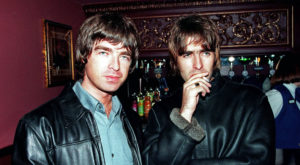“Britpop’s Back. But What Happened to Cool Britannia?” asks a recent headline in the New York Times. Quite a lot, it seems. Pessimistic about our prospects, and uninspired by our King’s agenda, Britain is in search of a new story. The afterglow of the 2012 Union Jack-waving optimism has long dimmed. Today, a hollow libertarian boosterism battles with provincialism, self-loathing post-colonial regret and plain indifference. To many, Slowthai’s Mercury-nominated lyrics capture it perfectly: there’s nothing great about Britain.
What we need, then, is something that both binds us and shines to the world: a new Cool Britannia to resurrect the “swaggering sense of national self-belief” we have lost. The problem here is that our former bluster was powered by the fundamental belief that Things Can Only Get Better. Today, most of us simply hope that Things Can’t Get Any Worse. Liz Truss’s short-lived Big Bang 2.0 and Rishi Sunak’s Californian techno-utopian dreams of a start-up Britannia have failed to provide any sense of collective belief in a better future.
Cool Britannia’s optimism was turbocharged by an onslaught of aspirational cultural production that gave Britain a joyous vibe of buzzy creativity and irreverence. We had Blur, Oasis, The Spice Girls, Suede, Massive Attack and Pulp. Our fashion industry was trailblazing with Alexander McQueen, Vivienne Westwood, Paul Smith, Ozwald Boateng, and John Galliano. The YBAs made British art the talk of the planet. Hugh Grant looked fabulous.
We still have star power. The problem is that so many of our icons — consider Harry Styles, Adele and Daniel Kaluuya — have a British-accented charisma that feels more Hollywood than Blighty. They are too geographically and thematically distant and mainstream to build a new national myth around.
So, what do we do? The answer can perhaps be found in Tara Isabella Burton’s latest book Self-Made: Creating Our Identities from Da Vinci to the Kardashians. Here, Burton explores how figures through history have mastered the art of self-creation to fulfil their wildest dreams. From Renaissance Italy to Instagram, Burton reveals the dark arts of building a hypnotic brand that bends an audience to its will. From narcissist painter Albrecht Dürer and Regency dandy Beau Brummell to the proto-fascist Giovanni D’Annunzio and Paris Hilton, each character offers a playbook for how Britain can build a brand that delicately synthesises a new inspirational self-image.
Burton’s theory is simpler than you might expect: concoct a cocktail of mesmerising vibes and fake it until you make it. Quoting Baldassare Castiglione’s 1528 handbook The Courtier, she explains that the best brand-building comes from going “about selecting this thing from one and that thing from another. And as the bee in the green meadows is ever wont to rob the flowers among the grass, so our Courtier must steal this grace from all who seem to possess it”. Castiglione’s methodology is captured in the mysterious concept of sprezzatura — translated as nonchalance or lightness. Sprezzatura, Castiglione explains, “conceals design and shows that what is done and said is done without effort and almost without thought”.
Burton says that this can be achieved by “lying, at least the delicately artful ‘little white lie’ kind, is integral to self-making”. To become who we want to be, “we first have to convince other people that we are what we are not”. In other words, modern Britain might be far from a fountain of relentless creativity, but if we take on the sprezzatura mindset of Castiglione’s honeybee, perhaps we can begin to give the impression that we are. After all, it is also the case that everything was not fine in the Nineties — no matter how much Blair wandered around pretending to be Jesus in chinos.
One bee who is already busily buzzing about is Daniel Lee, Burberry’s new Chief Creative Officer. Lee, a 37-year-old working-class Bradford-born designer, has been working in the shadows cultivating a Cool Britannia 2.0 that is both scintillatingly hot and British. Only five years ago, his predecessor Riccardo Tisci torched Burberry’s classic crusader knight logo and replaced it with an Instagram-friendly orange monogram. Trampling over a century of heritage, he turned Burberry into yet another bland cosmopolitan luxury brand. Yet, this year, Lee launched a whipsaw reversal. Not only has he restored the knight, but he has revived an even more ornate version of the logo from 1901 that emphasises the Latin prorsum slogan, meaning “progress”.
But Lee’s new Burberry is far from jingoistic heritage maximalism. With adverts that feature foxes, corgis, swans, rabbits, Vanessa Redgrave, Raheem Sterling and Skepta, his rebrand captures the timeless equities that Britain has leveraged in our greatest moments. Lee recognises the dynamic contradictions that underlie the nation’s soul: the heritage and the zest for innovation, the aristocratic and the punk, the local and the global. Harmoniously resolving these tensions is the key to driving modern Britain forward — and making it sexy.
Of course, the quiet revolution triggered by Lee must not solely be led by a fashion brand; Burberry’s Britannia is not a substitute for a whole nation’s hopes and dreams. A national mythology cannot be driven by adverts alone, it should be accompanied by a wave of art and culture that transmits something new.
Moreover, if Cool Britannia 2.0 is to thrive, it needs a conductor. In the Nineties, that role was partly filled by Tony Blair. And he was desperate to make sure everybody knew it, constantly orchestrating photo opportunities that placed him in the thick of it. Comparably, despite an equivalent lead in the polls, Keir Starmer is the antonym of Cool Britannia. Not even a photoshoot in a Stone Island polo shirt next to a graffitied wall in Berlin would convince Britain that we are entering a new dawn of cool. Nor will his faux-nostalgia for football, the smell of hamburgers and horse shit.
This leaves a vacuum, a gaping hole awaiting a Arch-Sprezzatura Honeybee who will come out of the shadows and deliver us this hallowed new Cool Britannia. They must have the stature of a statesman, the respect of the masses, and the nonchalance that makes the nation gush and gasp. With Starmer and Sunak ill-equipped for the role, and King Charles now 74, the throne lies empty.
Princess Kate, Britain’s most popular royal, may stake a claim with her Vampire’s Wife dresses, misspent youth, and ketamine-fuelled-rave attendance, but ultimately she is too above culture to really drive it. Stormzy, the rap phenomenon and emerging national treasure, has signalled a willingness to wear the weight of the crown. In his Banksy-designed Union Jack stab-proof vest, he has demonstrated pedigree in wrestling with Britain complex modern identity. Perhaps more importantly, he is also on Burberry’s roster. However, as an already iconic creative powerhouse, he seems better suited as the first violin.
Noticeably lurking is Manchester mayor Andy Burnham. The bookies’ favourite to succeed Starmer has already signalled his honeybee credentials. After two failed leadership bids, Burnham has rebranded from strait-laced Blairite Westminster drone to a laid-back-but-serious, 24-hour-partying King of the North. In October, he will launch his new SXSW-inspired Beyond The Music festival and conference in Manchester — the originator of so much of Britain’s cool. The event, Burnham claims, will be about building “a creative alliance for the future” that brings together music, tech, gaming, brands and more.
Amid the pessimism, however, the prospects of a Cool Britannia resurgence feel dim. Yet consider this: in the age of self-making, the currency of vibes trumps stark realities. The ultimate heroine of Burton’s book is Caroline Calloway, the audacious Scammer Priestess. Despite squandering a half-million-dollar book advance and selling Snake Oil, Calloway has thrived by distorting reality. From faking exam results to get into Cambridge to selling fake workshops and proudly buying Instagram followers, every lie she tells sees her soar to new heights. Her audacious approach, an intoxicating dance with risk is the brand-building equivalent of Bazball. She throws everything at the wall and does not care what sticks. She’s the master of fucking around and finding out. Perhaps Britain’s path to rediscovering its swagger lies in harnessing the spirit of Calloway, simply ignoring the gloomy reality and playing without fear.
Disclaimer
Some of the posts we share are controversial and we do not necessarily agree with them in the whole extend. Sometimes we agree with the content or part of it but we do not agree with the narration or language. Nevertheless we find them somehow interesting, valuable and/or informative or we share them, because we strongly believe in freedom of speech, free press and journalism. We strongly encourage you to have a critical approach to all the content, do your own research and analysis to build your own opinion.
We would be glad to have your feedback.
Source: UnHerd Read the original article here: https://unherd.com/



